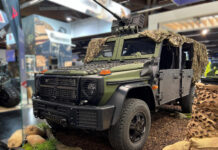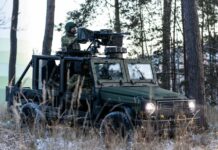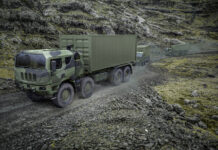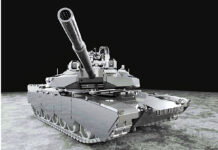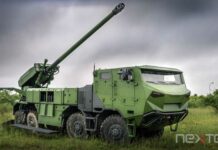Mercedes-Benz recently presented the new generation G-Class vehicles for military and security applications to potential customers and the press at the G-Class Experience Center in Graz, Austria. The new vehicles are based on the 464 series, which went into series production two years ago for civilian applications.
According to the company, the new vehicles will be factory-designed for military applications resulting in enhanced mobility, improved reliability, and easy operation. As a sign of its robustness, a forty-year-old G-Class, with a mileage of 80,000 km, was presented among the new G-Class vehicles. It was ready to drive without any restrictions, as was stressed by representatives of the company.
The variants presented were equipped with a 163-kW in-line diesel engine (Euro 3) that produces 600 Nm of torque. Despite the increase in power, the combined consumption has been reduced to less than nine litres per 100 km. Moreover, Mercedes-Benz specifies 120 km/h as the top speed. Thanks to its automatic transmission, engageable differential locks (longitudinal and transverse) and electronic assistants, the new G-model is said to be easy to handle even under difficult environmental conditions.
Severe Gradient
Participants at the presentation were given the chance to experience the vehicles themselves. The driving programme included steep stretches with severe gradients on unpaved, paved and concrete roads, in mud and deep water, as well as driving manoeuvres with extreme curves involved.
The increased demand for electrical energy is met by a 24-V network, which is set up in parallel to the 12-V network for the vehicle’s technology. Two generators provide the energy, with the 24-V generator alone producing 3.8 kW. The equipment’s elements that consume electrical energy are protected against electromagnetic radiation in accordance with applicable standards.
During its operation, the subsystems are controlled by monitoring software in order to avoid failures or damage (due to overheating or lack of lubricant for example). In order to avoid operating restrictions in emergencies – such as escaping from a hazardous situation – the monitoring function can be switched off with an emergency override switch (EOS) and continued operation can be enabled, albeit with the risk of serious engine damage.
The company underlines that the new design and production methods have considerably increased the freely available payload – a significant customer request from previous user conferences. The Station Wagon (design BA 06) with an enclosed cabin and four seats – primarily for performing command and liaison tasks – offers a payload of 1.1 tonnes at a gross vehicle weight of 3.5 tonnes. The chassis with two-seater cab (BA 09) is equipped with a three-point mounting to accommodate dedicated superstructures and is designed for a payload of 2.4 tonnes at 4.8 tonnes gross vehicle weight.
The Armoured G-Class
A third variant presented was a protected G-Class (BA 06) equipped with an armoured cabin and four mine protection seats from Plasan. The vehicle involved in the feasibility study is equipped with reinforced axles and reaches a total weight of over six tonnes. The design and equipment of the protected vehicle meet known military requirements.
The new G-Class vehicles are due to be produced in the three main versions presented. The Station Wagon (BA 06) is in top position in terms of the number of units. A smaller production volume is expected for the chassis with a two-seater cab (BA09). Finally, there is the protected version, probably with the lowest production figures.
As of yet, there are no production orders for the new vehicles though a double-digit number of prototypes have already been produced. It is expected that series production could start in 2022. According to Daimler’s sales team, there is interest in the new vehicles among the armed forces in northern and southern Europe, as well as in North America. The Station Wagon in particular also meets the requirements of the German Armed Forces, which, following a recent major procurement effort of so-called G-Class GREENLINERS, wants to further expand its stocks in this vehicle class.
The performance capacity of the new generation G-Class often reaches physical limits. In order to be able to use the potential, especially in borderline or dangerous situations, thorough driver training is necessary, which Mercedes-Benz also offers as an option.




